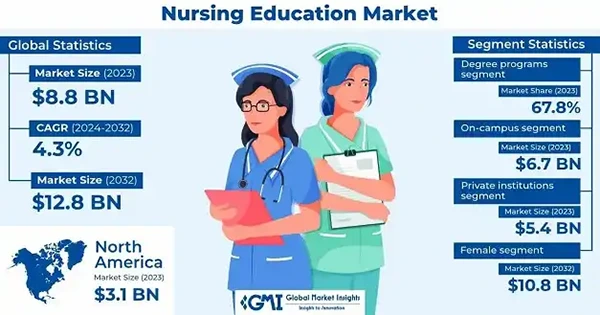
In today’s rapidly evolving world, technology plays a crucial role in accelerating the pace of life.
It opens doors to individuals, locations, and opportunities that were once hard to reach, particularly in the realm of education and specialized fields like nursing.
Accelerated nursing programs provide an alternative for those looking to bypass conventional nursing education while still developing essential skills.
While traditional nursing programs remain a viable option, accelerated courses attract individuals seeking to save both time and money.
In this blog post, we will delve into the reasons behind the growing preference for expedited nursing education among students.
Let’s begin!
Key Takeaways
- Looking at some accelerated nursing problems
- Decoding some financial metrics
- Discovering all the future-proof programs for aspiring students
Accelerated Nursing Programs Offer Many Benefits
There used to be only one way to obtain a nursing degree, but those days are gone. Today, many people choose the alternative route and enroll in accelerated nursing programs. However, others are torn between traditional nursing school and the new, expedited route.
Both options have the same result, but the path is different in many ways. Accelerated nursing programs carry many invaluable benefits, such as:
Intriguing Insights

This infographic shows nursing education market statistics.
1. Unparalleled Flexibility
Life is busy, complicated, and full of responsibilities that demand a lot of attention. This applies whether you’re a young adult fresh out of high school or a busy 30-year-old. Today, you don’t need to make such difficult sacrifices to enter the nursing field if you choose an accelerated online nursing program.
Accelerated nursing programs offer unparalleled flexibility, which is why they’ve become so popular compared to traditional programs. This flexibility gives you more freedom over your schedule and the pace of your curriculum. It’s hard to balance a job with school when you enroll in a traditional nursing program.
However, the ability to work while taking accelerated nursing courses can set you up for success and spare you a lot of stress. Such programs still take a lot of work, but the convenience and flexibility make the experience quite rewarding. You can tailor your curriculum to fit your schedule and lifestyle, and that is a luxury.
2. Less of a Financial Sacrifice
Earning a traditional nursing degree is often an expensive prospect. The combined cost of education, supplies, and, if necessary, boarding can quickly add up. That’s especially true if you’ve already earned a bachelor’s degree and want to go back and get a nursing degree.
Naturally, you can save money with an accelerated online nursing program in many ways. You don’t need to relocate, and that alone can save a fortune. Accelerated programs are also much shorter than traditional nursing programs, so you don’t have to pay for as many semesters.
That, paired with the fact that you can work while taking accelerated online courses, can also help on the financial front. This understandably appeals to future nursing students looking to maximize their investment and avoid waste.
3. Perfect Opportunity to Choose a Second Career
Changing your career is a big step, and it’s often worth it. Some people hesitate to choose nursing as a second career because of the time commitment. If you already have a bachelor’s degree, you can quickly complete an Accelerated Bachelor of Science in Nursing (ABSN).
For example, you may have gotten a bachelor’s degree and spent a few years working a business or retail job. After a few years, you can leverage your bachelor’s degree to enroll in an ABSN program. That way, you can graduate with a nursing degree in as little as 11 to 18 months.
This is a great privilege for those who feel that nursing is their calling, even if it wasn’t their first career. Otherwise, it’s hard to drop your responsibilities and enroll in a nursing program when you’re already busy with work.
4. Focus Strictly on What Matters Most
Traditional 4-year nursing programs require students to take classes outside of their major. However, ABSN students have already done this, as you must have already gotten a bachelor’s degree to qualify. Accelerated nursing programs eliminate the filler and concentrate solely on relevant information.
This single-minded approach lets students focus solely on information that will help their career. You can pour all of your energy into building a relevant skillset and maximizing your potential.
Interesting Facts
Nursing shortages are a global concern, with projections indicating a significant gap between the supply of nurses and the demand for healthcare services. (Source)
5. Quickly Enter the Field
Entering a traditional nursing program typically means that you won’t enter the workforce for at least 4 years. The basis for a bachelor’s degree, however, is already in place for ABSN students. Because of that, they can qualify for board certification in just 11 to 18 months after starting an ABSN program.
Having the goal posts so close can do a lot to instill confidence and motivate students. If you ask someone, “Are accelerated nursing programs worth it?”, the expedited timeline is likely among the first things they’ll mention. This is especially helpful for aspiring nurses who currently work in another field and want to change direction.
Accelerated Nursing Programs Are the Future
The academic world has seen many innovations and improvements in just the past 10-15 years. More people now have the opportunity to pursue their dream degrees without making such significant sacrifices. This has led more aspiring nurses to take the first step and enroll in accelerated nursing programs.
Accelerated nursing programs help students pursue nursing degrees while balancing work, life, and responsibilities. This, paired with the scheduling freedom and potential money savings, can make a huge difference compared to traditional programs. That is ultimately one of the biggest reasons why so many people choose accelerated programs over traditional programs.
Ans: Statistics plays a vital role in nursing, enabling nurses to analyze data, understand research, and improve patient care. It’s used for both summarizing data (descriptive statistics) and concluding about larger populations based on samples (inferential statistics).
Ans: The “6 Cs of Nursing” are a set of core values and principles that guide nursing practice. They are Care, Compassion, Competence, Communication, Courage, and Commitment.
Ans: Nursing education faces several challenges, including a shortage of nurse educators, difficulties integrating technology, lack of adequate clinical placements, and the need to update curricula to match evolving healthcare practices.